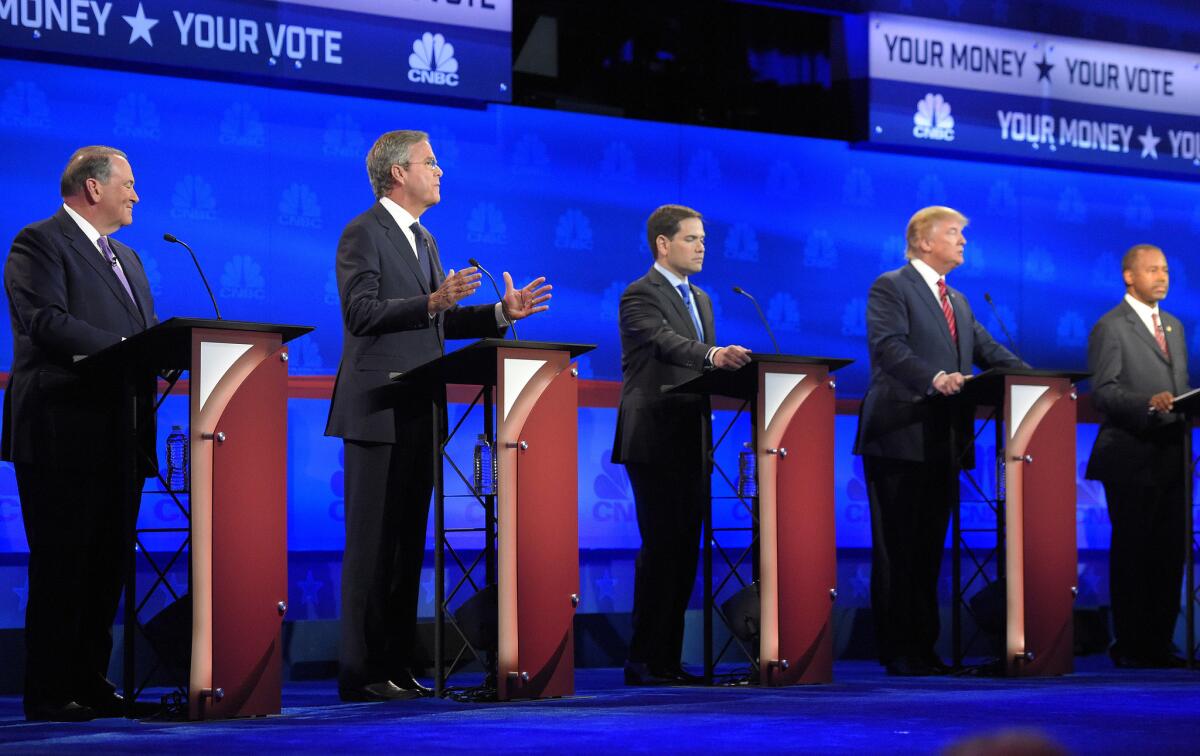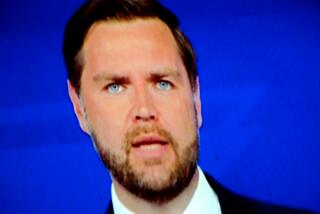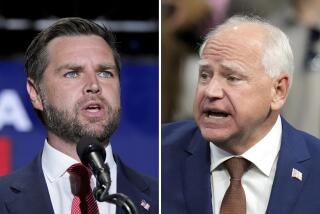Yes, Ted Cruz, CNBC’s Republican debate was a cage match

Jeb Bush, second from left, is flanked by Mike Huckabee, left, Marco Rubio, center, Donald Trump, second from right, and Ben Carson during the CNBC Republican presidential debate at the University of Colorado, Wednesday, Oct. 28, 2015, in Boulder, Colo.
- Share via
There is a new game show in town, or back in town, called something like “Presidential Debate,” in which players are asked questions, and possibly answer them, while attempting to demonstrate by the force of their personality that they are qualified to lead the free world. It’s a little like “Jeopardy” without the buzzer or correct answers (there may be money, eventually); a little like “America’s Got Talent,” without the singing, comedy or magic; and a little like a beauty pageant, without the swimsuits.

Times’ political analyst Cathleen Decker and Times’ political writer Seema Mehta talk about the third Republican debate.
As to the answers, it’s not necessary, as far as I can tell, to stick to facts as long as you believe or seem to believe everything you say. It’s not even necessary to answer the question you were asked; you can pick some other question entirely to answer, or make a speech you’ve prepared in advance. It all counts. Accuracy doesn’t seem to affect one’s standing in the game, which will end in a contest between the Donkeys and the Elephants right around the time of the next World Series. The winner gets to be president -- for four years, like in the Olympics or the World Cup.
Meanwhile, there are still a lot of players in the tournament, more so on the Republican side, where their numbers are such that the three debates so far -- the latest, hosted by CNBC and focusing on the economy, took place Wednesday night at the University of Colorado at Boulder -- have been divided into main card and undercard, or prime time and “happy hour” contests, in which the least likely contestants get to open for the more likely ones, though many of the more likely ones are also considered unlikely. (There’s only going to be one nominee, after all, and there were 14 candidates in Wednesday night’s debates, down only two from last month’s meet-up.)
The likeliness factor is somewhat complicated by the fact that the party’s front-runners, Donald Trump and Ben Carson, have no political experience -- none at all -- which makes them, for this indefinite moment, paradoxically more popular than those who do.
TRAIL GUIDE: All the latest news on the 2016 presidential campaign >>
The evening session began with a strangely aggressive introduction that seemed to picture a nation on the verge of complete collapse, and moved quickly to a barrage of mostly substantive questions that managed nevertheless to sound rude and unfair.
“This is not a cage match” Ted Cruz said at one point, having made the not-empty charge that the moderators -- Becky Quick, Carl Quintanilla and John Harwood -- were asking questions designed to make trouble. But of course they were: It was a cage match. Just like in the WWE (and on “Project Runway” and “MasterChef” and every reality competition ever, including Trump’s own “The Apprentice”), the opponents were encouraged to talk trash about one another. Some obliged, and some demurred. Trump, for his part, has the uncanny ability to praise and demean his opponents in practically the same sentence with equal confidence; while Jeb Bush, chiding Marco Rubio for missing votes in the Senate, just came off as opportunistic.
Still, if the moderators were poking the bear some of the time -- asking Bush about his falling numbers, Carly Fiorina about her firing, Ben Carson about his math, Cruz about his ability to be the “problem solver” America wants, Mike Huckabee to pronounce upon Trump’s “moral authority” and Trump whether he was running “a comic book version of a presidential campaign” -- they were also herding cats much of the rest of the time. There was yowling. There was more cross-talk than a Robert Altman movie. The show ran them as much as they ran the show.
And it was a show. Everyone onstage, and the questioners facing it, was performing: for the crowd, for the critics, for their colleagues. The questioners have a responsibility to the electorate, but more immediately they serve their network; the candidates, asked to discuss policy, are only trying to make an impression, to stay on the island. It’s not a question of character yet so much as creating characters. The bigger job was not to be boring, and by those lights, anyway, you’d have to call the evening a success.
Follow Robert Lloyd on Twitter @LATimesTVLloyd
MORE DEBATE COVERAGE:
Candidates attack one another and the media
Third GOP debate appears to broaden field, not winnow it
Marco Rubio shows he can take a punch, and swing right back
More to Read
The complete guide to home viewing
Get Screen Gab for everything about the TV shows and streaming movies everyone’s talking about.
You may occasionally receive promotional content from the Los Angeles Times.







